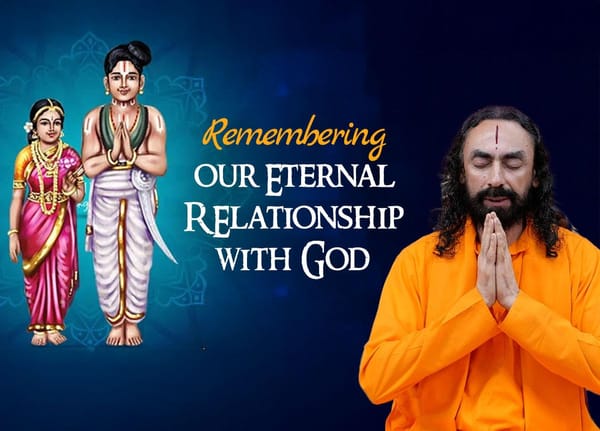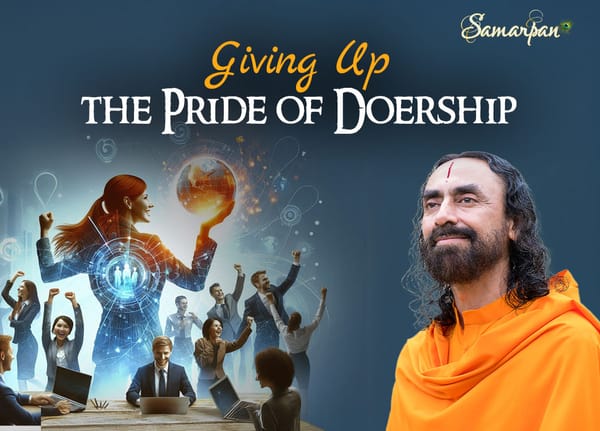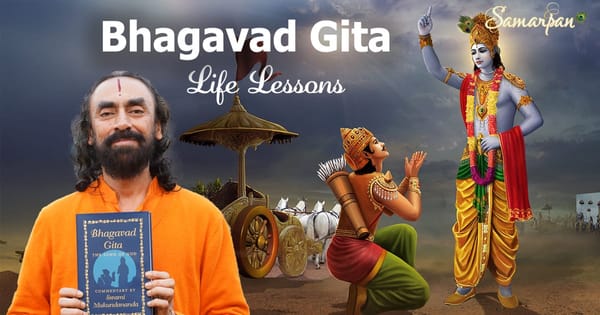
From the Editor’s Desk
Could there be a bigger challenge in life than managing personal relationships? We live in a social world where developing and maintaining a harmonious relationship with others is as essential as eating food. Whether personal or professional, it takes an exceedingly long time to nurture a relationship but only a moment to break. All of us have experienced successful and unsuccessful relationships and pondered over why things went wrong.
In this issue, we take the support of Vedic knowledge (or tatvagyan) as taught by Swamiji, to shed light on an age-old challenge. We also present a practical tool for application to improve the quality of personal relationships. As you navigate the challenge, please share your inspirational stories with us.

Vedic Wisdom & Application
Challenge of the Month
Managing Personal Relationships
Reflection Questions
- Why do relationships fail?
- Can relationships be perfect?
- What makes a healthy relationship?
Why Do Relationships Fail?
If we ask psychologists or counselors, they will provide a plethora of reasons for failed relationships. From poor communication to untrustworthiness and everything in between, failed relationships are usually attributed to multiple causes. Swamiji shares very thoughtful explanations and strategies for mending failed relationships.
-
Unrealistic Expectations. All relationships in the material world are conditional in nature. When mutual expectations are fulfilled, problems do not manifest. However, it is virtually impossible to fulfill everyone’s expectations all the time. Expectations of others imply an element of selfishness. When the expectations are not met, the relationship starts going downhill. Relationship experts label this as incompatibility, loss of trust, putting the burden of your happiness on someone else, etc.
The Bhagavad Gita beautifully explains this as a function of different gunas (sattvic, rajasic, or tamasic; BG 14.5 to 14.10). Everyone’s “chitta-vritti” or temperament is different, influenced by their gunas. The material states keep fluctuating and result in conflicts when people’s gunas are different. The lesson to learn here is to accept that conflicts will occur because the mind is made of maya, and to eliminate our expectations of others to control our own pleasure and disappointments.
-
Imbalance in Reciprocity. Relationship experts say that lack of time for others, poor communication, jealousy, and complaining about trivial things may lead to downfall. Swamiji explains in 7 Divine Laws that relationships are like bank balances; one must make sufficient deposits before making withdrawals. Deposits are made in the form of smiles, praise, love, affection, assistance, overlooking faults, sacrificing time, and supporting the other’s goals. Withdrawals are in the form of instructions, reprimand, coercion, correction, disagreements, or negative interactions in general. Conflicts arise when we make greater withdrawals compared to deposits. The lesson to learn here is to make sufficient emotional deposits so the withdrawals will not create an imbalance in relationships.
-
Taking Relationships for Granted. Experts characterize this issue as one where someone weighs the relationship as a bargain – assumes the levelheaded partner will make all the sacrifices, makes decisions without the partner’s input, is dishonest, and expresses excessive anger knowing that the partner will not leave.
Swamiji says that when people become very secure in their relationship, they stop making emotional deposits with the assumption that previous deposits will last forever. They forget to engage in acts of affection and kindness or appreciate the loving gestures of the partner (or any other person). People forget that relationships sustain love, not lust (selfishness) or business (give-and-take). A healthy relationship is founded on responsibility. Refusal to take responsibility to maintain a relationship and to own mistakes can destroy the foundation. The lesson to learn here is to be willing to take the responsibility to change ourselves and to take care of others for a smoother relationship.
Can Relationships be Perfect?
In 7 Divine Laws, Swamiji says that there is a test of true love. “True love is that where there is a reason for it to be destroyed, and yet it continues unabated” (p. 122). The spiritual perspective is to understand the true nature of relationships.
All worldly relationships are both, self-serving and temporary in nature. As materially conditioned souls, we are not equipped with selflessness. Even when two people are influenced by sattva guna, the quantity of the guna may be different, resulting in a conflict sooner or later when self-serving needs are not met. With respect to the length of relationships, even though we may be related to others through birth, marriage, or social networks, these ties will be severed forever upon death. The only permanent and perfect relationship that the soul has is with God. God is our only eternal relative who loves us unconditionally. If we understand the secret of true and divine love, our worldly relationships will also improve. Lord Krishna tells Arjun:
गतिर्भर्ता प्रभु: साक्षी निवास: शरणं सुहृत् |
प्रभव: प्रलय: स्थानं निधानं बीजमव्ययम् ||18||
gatir bhartā prabhuḥ sākṣhī nivāsaḥ śharaṇaṁ suhṛit
prabhavaḥ pralayaḥ sthānaṁ nidhānaṁ bījam avyayam (BG 9.18)
With respect to the above verse, Swamiji has explained that we become attached to and rely upon the support of worldly relatives. However, none of them can give us the perfect love for which our soul yearns because the soul is a tiny fragment of God, and its eternal relationship is with Him.
What Makes a Healthy Relationship?
A truly healthy relationship necessitates sacrifice, understanding, tolerance, and patience, not just occasionally but consistently across time. Swamiji says that we should develop the perspective of bhakti or seva-bhav to discharge the responsibility to God by taking care of other people. This will require some detachment but will help us to make the relationship work without feeling resentful about care-taking in the long run. We will take care of other souls, whether family members, friends or colleagues, to please God. We need to reprogram our intellect to improve our relationships by developing spiritual intelligence (see 7 Divine Laws, pp. 125).
Swamiji further adds that we need to perfect our own relationship with God before we can develop seva-bhav toward others. A true relationship with God is selfless; not bartering for favors, nor asking for worldly rewards for seva completed or to be done in the future. God is pleased only by the loving devotion of the devotees for His pleasure.
Here are some strategies based on tatvagyan to improve existing relationships.
-
Strengthen your own personal relationship with God.
-
Bring God into the relationship. Think of the relationship as sacred. Love God more than your partner, child, or anyone else. Help each other grow in your relationship with God. Rely on God and each other when times are difficult.
-
Family members can engage in devotional activities together. They can pray together, study the scriptures together, pray for each other, and pray for others outside the family who need help. Make helping others a relationship goal.
-
Family members and friends can make it a goal to engage in seva for God and Guru as a family.
-
Attend Satsangs together before going on an outing or a date.
-
Ask God to help you change your negative attitudes or relationship problems.

Tools for Your Personal Growth
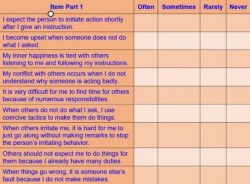
Think about one person with whom you want to improve your relationship – spouse, child, colleague, or friend. Use this form to assess your own relationship with that person. You can download the blank form if interested in using the form to assess your relationship with different people. Email the filled form to SamarpanTeam1119@gmail.com if you would like an interpretation of the score.

Love to Hear from You
- How did you apply the Vedic Wisdom?
- What challenges did you experience in the process?
Please share your comments under “Join the Discussion” below. We would love to hear many voices as we all learn and grow together.

Gems of Wisdom from Swamiji
Here are some YouTube video titles and related links where Swamiji describes the nature of worldly relationships and ways to develop healthy relationships. His book is referenced as well.
- #1 Mistake that Kills a Relationship – Why Relationships Fail
- The Secret to Healthier and Happier Relationships
- True Love Need Not be Romantic
- Mukundananda, S. (2020). 7 Divine Laws to Awaken Your Best Self, HarperCollins Publishers: Noida, India.



Hold Your Breath! Check out Upcoming Events
We are very excited to share with you, two dynamite events that everyone has been looking forward to!
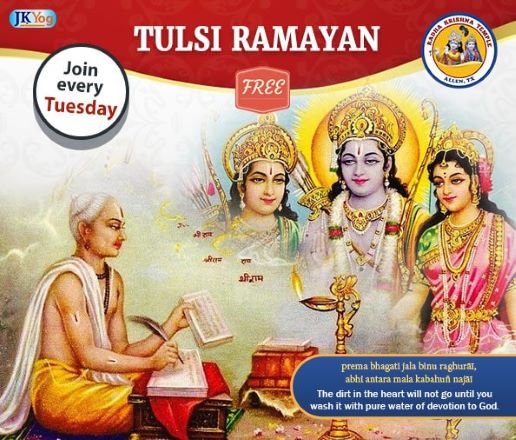
Tulsi Ramayan
Radha Krishna Temple’s Center for Indian Culture and Education (CICE) has started a brand new series of online classes on Tulsi Ramayan, the legendary leelas of Lord Ram. The class includes dohas from Geetawali, Ramcharitamanas, and Kavitawali. These epics go beyond the timeless leelas of Lord Ram.
Lessons gleaned from these leelas can be applied in everyday life, such as the value of truth, perseverance, commitment, the omnipresence of divinity, and the triumph of dharma over adharma. These life lessons are integrated into the great narrative, which, like the Bhagavad Gita and Mahabharata, reveal more insights every time someone hears them. The class is conducted by Dr. Vijaykumar Krishnan under the auspices of the “Learn Engage Assimilate Flourish (LEAF) Program for Inner Growth.”
Classes started on January 26, 2021, but it is not too late to join. We meet every Tuesday from 8:00 to 9:00 PM CST (7:30 to 8:30 AM IST). Register now!

Srimad Bhagavat Mahapuran
JKYog Academy also started a new series of classes on Srimad Bhagavat Mahapurana, one of the 18 great Puranas that integrates themes from different philosophies. This revered text is the essence of bhakti. Get ready to immerse yourself in love and devotion to Lord Shri Krishna by participating in this program.
The class is conducted by Mr. Rajesh Anand, a certified yoga instructor, and a leader of Bhagavad Gita and Bhagwatam online discussions for many years. Classes started on January 22, 2021, and are held every Friday and Saturday at 9:00 PM (CST) and Saturday and Sunday at 8:30 AM (IST). Register now!

Voices from the Global Community
We would like to share ways in which a member of our global community has been impacted by the scriptural knowledge as taught and disseminated by Swamiji. This month, we feature Pallavi Mansankhare who obtained a Master's degree in Electrical Engineering from the Birla Institute of Technology (BIT) Mesra, Ranchi, India. She currently works as a Principal Quality Assurance Engineer in Boston.
Pallavi has lived in Westborough (a suburb of Boston) for the last 17 years with her family including her husband, two lovely daughters, and in-laws. Her older one is a freshman in college and the younger one is in elementary school. She is trained in Hindustani classical music and loves to sing/listen to music. Her other interests include reading books and gardening. She has regularly practiced yoga and meditation for 3 years. Pallavi attends JKYog’s online Bhagavad Gita courses and has started to participate in seva activities. She says that since her association with JKYog, she has been more diligent about recycling. In her spare time, Pallavi loves to spend time with her family. Please watch the video where Pallavi ji describes how he benefitted from Swamiji’s teachings.
We invite you to share your inspirations and success stories with us at secretary@jkyog.org.

JKYog Transforming Communities
Here, we share an amazing service by JKYog.
JKYog Music
JKYog recently launched its new Music Channel on YouTube called JKYog Music. Its main purpose is to provide opportunities to be a one-stop free shop for deeply devotional chants, music for yoga and meditation, and sacred mantras and chants by Swamiji. Connoisseurs of devotional music will find many alternative tunes by Swamiji at their fingertips!
The first kirtan “Shri Ram Jai Ram” was released on January 9, 2021, and is already a super-hit with 2.78 K subscribers, over 12,300 views, and scores of positive comments from the audience. Viewers were particularly impressed with the serene and ethereal quality of the music, the beautiful temple background, and the most divine and exquisite deities at the Radha Krishna Temple of Dallas (Allen). The Music Director, Harry Anand deserves a lot of credit for furnishing a contemporary touch to this kirtan.
The second bhajan “Radhey Govind Govind Radhey” was released on January 25, 2021. This too is an exquisitely beautiful kirtan that touches the heart and soul. Sung by Swamiji and directed by Harry Anand, the magic of the temple’s images is unprecedented. Within 18 hours after its release, there were over 1650 views and numerous positive comments. You too can subscribe to JKYog Music to take advantage of the soulful renditions.

Glimpses of Past Events
Want a glimpse of our recent event? This month we share beautiful glimpses of Jagadguruttam Diwas.






